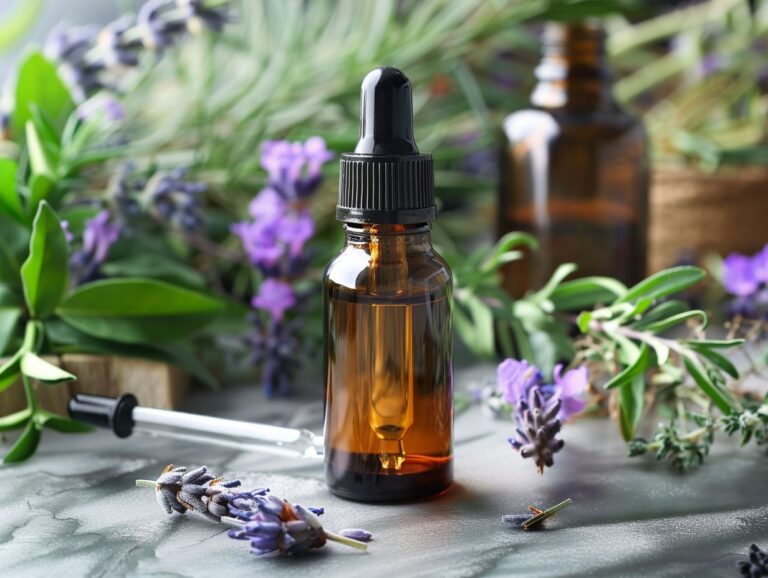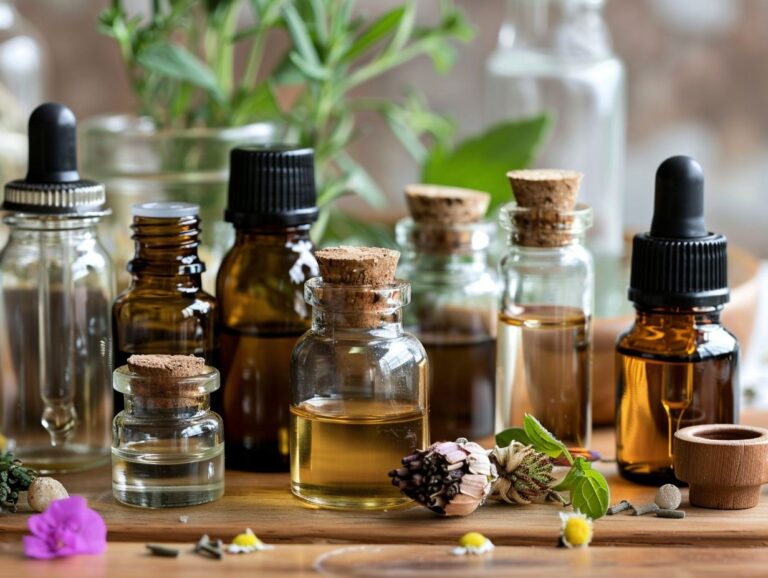Do Essential Oils Kill Bugs
Essential oils have been used for centuries for their various benefits, from aromatherapy to natural cleaning products.
Discover how essential oils work, the benefits of using them, and which types are best for keeping bugs away.
Learn how to use essential oils for stink bugs safely and effectively to ward off mosquitoes or ants.
Explore the world of essential oils and their bug-repelling properties!
Key Takeaways:
What Are Essential Oils?
Essential oils are natural, aromatic compounds extracted from plants through distillation or cold pressing.
These concentrated oils have been used for centuries across various cultures for their therapeutic properties and pleasing scents. The extraction methods vary depending on the plant source and the desired outcome. Distillation involves the separation of the aromatic compounds from the plant material through steam or water, while cold pressing is mainly used for citrus oils by mechanically pressing the rind to extract the oils.
Plant-based bug repellents have gained popularity as a natural alternative to chemical insecticides. Essential oils like citronella, peppermint, and eucalyptus are known for their insect-repelling properties and are commonly used in making natural insect repellents.
How Do Essential Oils Work?
Essential oils work through the sense of olfaction, where the molecules interact with the olfactory receptors in the nose and stimulate the brain.
This process triggers a cascade of neurological responses that can evoke various reactions. Olfactory receptors are specialized proteins that play a crucial role in sensing odors. When essential oil molecules bind to these receptors, they send signals to the brain’s olfactory bulb, initiating specific neuronal pathways. These pathways then connect to brain regions responsible for emotion, memory, and behavior. Insects, with highly developed olfactory systems, react strongly to certain scents emitted by essential oils, influencing their behavior and communication mechanisms.
What Are the Benefits of Using Essential Oils?
The benefits of using essential oils range from aromatherapy to natural cleaning products and insect repellents.
Essential oils have long been valued for their therapeutic properties, aiding in relaxation, stress relief, and improving mood. Plus their aromatherapy benefits, these oils also possess natural cleansing abilities, making them ideal for creating eco-friendly cleaning solutions that are free from harsh chemicals.
Certain essential oils such as citronella, lavender, and eucalyptus are renowned for their effectiveness in repelling insects. These natural insect repellents offer a safer alternative to conventional chemical-based options, especially considering the concerns raised by FDA regulations regarding the use of synthetic insect repellents.
Aromatherapy
Aromatherapy is a holistic healing treatment that uses essential oils to promote physical and psychological well-being.
One of the key aspects of aromatherapy is the various essential oil blends that can be used to target specific issues. For example, bug spray essential oils are commonly known for their calming properties, while peppermint oil can help with clearing the mind and enhancing focus. The method of diffusion plays a crucial role in dispersing these scents into the air, whether it’s through a diffuser, inhalation, or even adding a few drops to a warm bath.
These scents can have a direct impact on mood and relaxation, creating a soothing environment that can alleviate stress and promote a sense of well-being.
Natural Cleaning Products
Essential oils are effective ingredients in natural cleaning products due to their antibacterial and antifungal properties.
These oils, such as tea tree and lavender, can act as powerful disinfectants that not only eliminate harmful bacteria and fungi but also leave behind a pleasant aroma in your home. Plus their antimicrobial properties, essential oils are also valued for their environmental benefits. They are derived from plant sources, making them biodegradable and safe for the planet. By choosing natural cleaning solutions with essential oils, you are not only keeping your home clean but also contributing to a healthier environment.”
Insect Repellent

Among the most effective essential oils for repelling insects,
- citronella, known for its distinct lemon-like aroma, is a common ingredient in bug sprays and candles. Its strong scent masks the attractants that draw insects, making it an effective deterrent.
- Eucalyptus oil, with its camphor-like fragrance, is another powerful insect repellent.
- Notably, catnip oil, derived from the catnip plant, has been found to be even more potent than chemical repellents in some studies.
These essential oils present a natural and eco-friendly alternative to traditional bug sprays, with a pleasant scent and effective bug-repelling properties.
Can Essential Oils Kill Bugs?
Essential oils have insect-repelling properties, but their ability to kill bugs varies depending on the type of oil and concentration used.
In terms of insect repellency, certain essential oils such as citronella, peppermint, and lavender have been found to be particularly effective due to their strong scents that disrupt the insects’ navigation and communication. These natural scents act as a natural barrier, deterring pests from entering a space. The potency of these oils in actually killing bugs is influenced by factors like the specific insect species and its susceptibility to the oil’s components. For example, eucalyptus oil is a potent bug killer due to its high concentration of cineole, which is toxic to many insects.
Types of Bugs Essential Oils Can Kill
Certain essential oils like citronella and eucalyptus have shown efficacy in repelling and killing mosquitoes, ticks, and other insects.
Studies have demonstrated that peppermint oil is highly effective in repelling ants and spiders due to its strong scent deterrent. Similarly, lavender oil has been found to be a natural repellant against moths and beetles, keeping them away from clothing and pantry items.
Tea tree oil is known for its insecticidal properties, being particularly efficient in combating head lice infestations. Lemongrass oil has been proven to repel fleas and houseflies, providing a natural remedy for pest control.
How Do Essential Oils Kill Bugs?
Essential oils disrupt insect behavior and olfactory receptors, affecting their ability to locate and identify hosts or prey.
When insects come into contact with essential oils, the volatile compounds in the oils interfere with their neurotransmitter pathways and receptor proteins. This disruption can confuse the insects’ sensory perception, making it difficult for them to navigate effectively.
Additionally, essential oils can disrupt insects’ vital physiological processes, such as growth, reproduction, and development. This disruption can either repel insects or cause mortality, depending on the concentration and specific properties of the essential oil involved.
What Are the Best Essential Oils for Killing Bugs?
Peppermint, tea tree, lavender, eucalyptus, and lemongrass oils are among the best essential oils for repelling and killing bugs.
- Peppermint oil, with its strong scent, acts as a natural insect repellent, deterring pests like ants, spiders, and mosquitoes.
- Tea tree oil contains compounds that are effective in repelling insects like flies, ticks, and fleas, making it a valuable addition to bug repellent blends.
- Lavender oil not only repels bugs such as moths and mosquitoes but also has calming properties, creating a peaceful environment while keeping pests at bay.
- Eucalyptus oil is known for its ability to ward off mosquitoes and other flying insects due to its strong aroma that insects find unpleasant.
- Lemongrass oil is especially effective against mosquitoes, ticks, and fleas, making it a popular choice for outdoor protection.
Peppermint Oil
Peppermint oil is known for its refreshing scent and potent insect-repellent properties, making it effective against various pests.
Studies have shown that peppermint oil can effectively repel insects such as mosquitoes, ants, spiders, and even cockroaches. This natural insecticide works by disrupting the insects’ chemical signals, making it challenging for them to locate their prey.
One of the benefits of using peppermint oil as an insecticide is that it is safe for pets and children, unlike many chemical-based alternatives. To apply peppermint oil as an insect repellent, mix a few drops with water in a spray bottle and use it around doorways, windows, and other entry points where pests may enter.
Tea Tree Oil

Tea tree oil possesses strong antimicrobial and insecticidal properties, making it a versatile bug repellent against mosquitoes, ants, and more.
One of the remarkable aspects of tea tree oil is its ability to repel a wide array of insects, including not only mosquitoes and ants but also flies, ticks, and fleas. This broad-spectrum efficacy is due to the oil’s potent bioactive compounds that disrupt the insects’ nervous systems, making them steer clear of areas treated with tea tree oil. What’s great about tea tree oil is that it not only drives away bugs effectively but also does so without the harmful chemicals found in many commercial insect repellents.
Lavender Oil
Lavender oil not only soothes with its calming aroma but also acts as a natural bug repellent, particularly effective against mosquitoes and flies.
Many are familiar with the calming effects of lavender oil when used in aromatherapy or massage oils. Another lesser-known benefit is its ability to ward off insects, making it a versatile essential oil to have on hand. When applied properly, lavender oil can act as a potent bug repellent that is safe and natural, without the need for harsh chemicals. Mosquitoes and flies are among the common pests that can be effectively deterred by the soothing scent of lavender oil.
Eucalyptus Oil
Eucalyptus oil is a potent insect repellent that is particularly effective against mosquitoes, ticks, and other biting insects.
In terms of bug repellents, eucalyptus oil stands out for its natural insecticidal properties. This essential oil is derived from the leaves of the eucalyptus tree and contains compounds that have been proven to repel a wide range of insect species. Mosquitoes, ticks, fleas, and even some species of ants find the aroma of eucalyptus oil unpleasant, making it a popular choice for creating effective insect repellent sprays and lotions.
One of the key benefits of using eucalyptus oil as a bug repellent is its effectiveness in keeping insects at bay without the use of harsh chemicals. This makes it a great alternative for those looking for natural and eco-friendly solutions to insect problems. Additionally, eucalyptus oil is known to have antiseptic and anti-inflammatory properties, which can provide added benefits when used on insect bites or stings.
Lemongrass Oil
Lemongrass oil, with its citrusy aroma, serves as a natural bug repellent against mosquitoes and other flying insects.
When applied topically, the powerful scent of lemongrass oil masks the body’s natural odors that attract insects, making it an effective deterrent in outdoor settings. It is important to dilute lemongrass oil with a carrier oil before applying it to the skin to prevent irritation. Diffusing lemongrass oil indoors can help keep pests at bay without direct contact. This versatile essential oil has been found to be particularly effective against common pests such as ants, flies, and gnats.
How to Use Essential Oils to Kill Bugs?
Essential oils can be applied directly to the skin or used in DIY bug spray recipes for effective bug repellency.
When using essential oils for bug control, it’s important to dilute them properly with carrier oils like coconut, almond, or jojoba oil to prevent skin irritation. For direct application, mix a few drops of tea tree oil with a tablespoon of carrier oil and apply to exposed skin areas. As for homemade bug sprays, combining oils such as citronella, lavender, and peppermint with water and a touch of witch hazel can create a potent repellent. Always do a patch test before full application to ensure compatibility with your skin.
Direct Application
Directly applying essential oils to exposed skin or clothing can provide immediate bug protection through their repellent properties.
The process of utilizing essential oils as bug repellents involves selecting appropriate oils known for their insect-repelling qualities such as citronella, lavender, peppermint, or tea tree. To apply, mix a few drops of the chosen essential oil with a carrier oil like coconut or jojoba, then gently rub the mixture onto the skin or clothing before heading outdoors. Safety precautions should be observed, as some essential oils may cause skin irritation, especially when used in high concentrations. It’s recommended to perform a patch test before widespread application to ensure no adverse reactions.
DIY Bug Spray

These plant-based bug repellents not only keep pesky critters at bay but also have the added benefit of being safe for both humans and the environment. Combining citronella and eucalyptus oils with water in a spray bottle creates a potent bug deterrent that can be used both indoors and outdoors. The strong aroma of these essential oils masks the scents that attract insects, making it an ideal choice for those looking for a chemical-free bug repellent. Simply spritz the solution around windows, doors, and outdoor seating areas to enjoy bug-free summers.
Are Essential Oils Safe for Pets?
While essential oils have insect-repelling properties, caution must be exercised when using them around pets, as certain oils can be toxic to animals.
When diffusing or applying essential oils around pets, it’s crucial to choose oils that are safe for them. Some pet-safe options include lavender, cedarwood, and frankincense, which can actually benefit the wellbeing of both animals and humans.
On the other hand, it’s important to avoid oils like tea tree, eucalyptus, and citrus oils, as these can be harmful to pets, causing reactions ranging from mild irritation to more severe symptoms. If you are wondering what essential oils kill bed bugs, check out our comprehensive guide.
Frequently Asked Questions
Do essential oils really kill bugs?
Yes, essential oils have been proven to effectively kill bugs. They contain natural compounds that are toxic to insects and other pests.
Which essential oils are best for killing bugs?
Some of the most effective essential oils for killing bugs include peppermint, tea tree, eucalyptus, and citronella. Each of these oils contains compounds that are lethal to insects.
How do essential oils kill bugs?
Essential oils contain natural compounds that are toxic to insects. When bugs come into contact with these oils, the compounds disrupt their nervous system, leading to death.
Are essential oils safe to use as bug repellents?
Yes, essential oils are a safe and natural alternative to chemical bug repellents. They do not contain harmful ingredients and are safe for use around children and pets.
Can essential oils kill bugs without harming humans?
Yes, essential oils can effectively kill bugs without causing harm to humans. However, it is important to use them in the proper dilution and follow safety precautions to avoid any potential allergic reactions.
Are essential oils a long-term solution for bug control?
Essential oils can be an effective long-term solution for bug control when used properly and consistently. However, they may not provide immediate results and may need to be reapplied regularly.








4 Comments